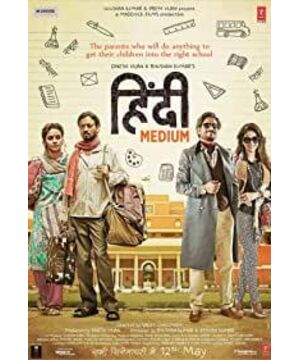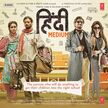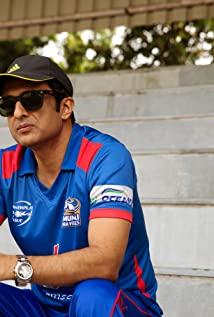This movie attracted me from the trailer. If Aamir Khan is the all-pervading male god in the Indian film industry, then Irfan Khan is a low-key golden supporting role in India. As an Indian actor who often wanders in Hollywood, Irrfan Khan 's performance is the same as Morgan Freeman's . The performance is flexible and flowing, looking natural and simple without being pretentious, humorous and light but never overpowering.
It may be the first time for you to watch this man's performance that is both familiar and unfamiliar, but you will never be unfamiliar with the names of these films: "Dante Code" , "The Fantasy Drifting of Young Pi" , "Slumdog" Millionaire .
In fact, you have all seen his figure, but his existence has long been integrated with the film, not obtrusive or rigid.
Compared with traditional Indian song and dance movies, this "Starting Line" is more like a Hollywood production, but the soundtrack and scenes have more Indian characteristics. As directed "Asoka" of Saket Chowdhury director, he is very clear, after a "wrestling, right, Dad," after a series of hot topics, what kind of film that would arouse our sympathy. Indeed, his selection of materials is very harsh - the issue of education .
As we all know, we often emphasize that "knowledge changes destiny" , but in the face of India's unique caste system and the huge disparity between the rich and the poor , as one of the channels for venting, Indian directors and actors have shouldered their responsibilities and conveyed critical awareness to the society. Responsibility to resist the spirit and positive energy .
A good parentage is decided by our parents, and many times we cannot refuse, but what I admire is that these Indian directors and actors use their backgrounds to show us their love, reflection, tolerance and criticism of their own country .
Due to the very complex social structure in India, it often helps these directors and actors. Because of this, the freedom of speech of the upper classes will not be under too much pressure.
Sometimes, showing goodwill in one's own power is a choice, not an obligation .
This is part humorous drama , but the theme show is very serious, viewing the process, I even forget the time, deeply immersive, could not help as director (Saket Chowdhury) and screenwriters (Sakit Chowdhury, Zeenat Lakhani, Amitosh Nagpal) Clap and applaud, I am awestruck by how many episodes are presented in artistic hyperbole and moderate tension. Those realistic scenes and real transmissions are simply the most common reality in this society.
When it comes to actors, I have to say that Irfan Khan 's acting is as expected, but Saba Kamal , a young girl born in Pakistan in 1984, made me admire. Everyone knows about the India-Pakistan conflict, but in addition to her beautiful beauty, Saba Kamal has more natural interactions with Irfan Khan . There is no embarrassment, no artificiality, and a natural performance. I just feel comfortable, natural, and cute. Her presence also shows that performance has no boundaries, and art has no nationality .
In this film, several social phenomena are reflected, which are a bit beautified and a bit realistic :
1 Worries about children's future plans
In the film, Raj's wife, Mita, raises concerns that are common to middle-class families in this era -- "too high or too low . " Although they have completed the foundation of everything through their own diligence, that is, the accumulation of primitive capital, but in their hearts, it is just like the so-called rankings in China for thousands of years: the lack of culture of scholars, farmers, workers, and merchants makes them build in their hearts. There is an innate fear, and Mita is a good portrayal here.
In particular, the hostility of the ex-boyfriend's current wife, the clear "circle" of contacts in the upper class, and the discrimination in Indian society have all aggravated Mita's anxiety.
So she wants to change her class by helping her children choose.
From the perspective of the middle class, in addition to being rich, the upper class must also receive the so-called elite education. Only in this way can the transformation of the class be completed from the inside out. And the director also satirized another interesting phenomenon in India here:
Speaking English = symbol of upper class.
Isn't this disgusting India, which has been disturbed by Western capitalist colonization? It is precisely because of the exploitative history of the East India Company that India became a colony, so that the whole society has a cognitive bias, and the psychology of foreigners and foreigners has so many similarities with China.
It is said that "education starts from the baby" , so Mitta did everything possible to send her children to a good private kindergarten to complete the first step of her elite education assembly line.
In my opinion, this is the same as that of parents in big cities. In capitalist countries, the so-called Ivy League schools are basically private schools. Only in China, a socialist country with characteristics, the best schools are public schools. But in the world rankings, private schools still have a big advantage.
Therefore, financially well-off parents have an upward impulse (otherwise they would not have successfully completed the accumulation of raw capital), so it must be their near-instinctive pursuit to let their children go further.
And here, the film is more interesting when it constructs the entire story frame:
If you don't want what you want, what do you do?
So under the pressure of his wife, the male protagonist Raj thought of various ways, and finally even made a choice against his conscience in order to take advantage of the loopholes.
Here, then, the first paradox that drives the storyline arises:
Do parents need to do anything for their children's future? (even abandoning ego, conscience, integrity, etc.)
In fact, it is not the first time that this topic has been brought to the screen. As early as in "Meteor Garden" , Shancai's parents are a good example; the movie "Changjiang No. 7" is also such a typical educational concept - only when you go to a good school , life will be smooth and steady, one step to the sky. They even ignore what children really need in the school process, namely the acquisition of knowledge and the right to grow up happily.
So here, the child has no right to choose, all the source lies in the parent's mentality.
2 as long as you want, there is time to drill
In the film, the so-called "fairness" of elite schools is well satirized. As long as there is a need, there will be channels , and those default social unspoken rules really abound.
For example, in order to take shortcuts at the beginning, Mita encouraged Raj to buy a school district room , wow! I was shocked when I saw this, isn't this China?
Afraid that the child will lose to other children , enroll the child in an early education class , wishing that the child is both civil and military, wow! It turns out that Indian parents do the same.
Arbitrarily using the child's ripening as a show-off exhibit, in order to fill their own anxiety, lead the child to live according to their own lifestyle, package the so-called "all for your own good" appearance, and then centralize power It seems that the so-called parents are really not separated from home and abroad.
And up to the government, down to the school, as long as you want, there is room to drill, there are loopholes to follow, there is no so-called real fairness, the last chance is reserved for those who have the capital to toss, the so-called charity is given to the poor "Chance" will only give birth to a hypocrite like the headmistress who works to "turn over a serf and become a master" .
Therefore, in the humorous performance, the falsity and hypocrisy of the society are fully displayed, and the second contradiction that promotes the plot of the film also arises:
Live your authentic self, or keep changing to fit society?
There are really many jokes here, two moves, the pretense of famous brands, the nonsense of government officials, and the long-awaited "bed scene" that finally came to nothing. The laughter is very dense but not vulgar, it really makes people feel very cute.
Therefore, in this contradiction, changing class background has become the ultimate goal pursued by the middle class, and it is finally achieved by illegal means , but for Mitta, her family has not really achieved the so-called true "equality" with the upper class. .
3 The "rich" kindness of the poor
Why am I putting quotes here?
In fact, the reason is very simple. Do poor people really have so much kindness to share with others?
In a slum area where survival is often a problem, facing the Raj parents who were not friendly at first, their sudden kindness made me mistakenly think that the Raj couple was going to be robbed and their luggage divided. Grab it all, really adhering to the essence of Mr. Lu Xun's "I have never been afraid to speculate on the Chinese people with the worst malice" , but then I found out that everyone really wanted to help, because I forgot the dress of the Raj and his wife, That's a style that doesn't seem worth grabbing.
Then Shyam came forward, showing the fact that poor people also have great goodness. At this time, I was a little puzzled, and even suspected that his motives were impure, because there is a saying in China called "poor mountains and bad waters make troublesome people" , Helping others inexplicably must be intentional, but the movie defeats my malicious guess with good reasons, because there is a very important premise in the movie:
Shyam didn't know Raj's true identity, and there were even a lot of jokes in the middle. Seeing that Mita can speak English, he immediately showed great respect for knowledge.
Isn't this the most prominent shining point of a simple working people?
Although I think in China, this is difficult to achieve, but in my opinion, India has every reason to achieve it, because Indians believe in religion, whether it is Hinduism, Buddhism, Islam or Christianity, in short, every doctrine developed in India is It is to preach to the people: You must accumulate virtue and do good deeds, and you must love your neighbors, so that your soul will be protected by God.
Indians don't eat beef and are very religious, so in the face of Raj, a compatriot who is suffering like myself, I have every reason to believe that Hiram's kindness is reasonable.
This leads to the third inconsistency point of the story that drives the plot:
Can the characters of the movie remain the same before and after learning the truth?
The director is very good at handling this plot. He did not create a sage who doesn't care about everyone, but really wrote a person, an ordinary person who will expose his friends for his own rights, but it is this ordinary person who is in the skin. Under Ya's embrace, she wiped away her tears and accepted the arrangement of fate.
This is also a natural transformation of his personality, neither abrupt nor exaggerated. Because the sins of parents do not need to be borne by children , this is not only the cognition of good people, but also the consensus of ordinary people.
When I have the right to choose, I am willing to embrace everyone who has hurt me with kindness. This is the best education for my children.
It was precisely because of Hiram's departure that he finally helped Raj to regain his sleeping conscience. When he learned that the principal was not a true educator, but a businessman who took advantage of his power, Raj also angrily made his final choice.
Here, the film helps Raj to find the best way to fight back when faced with social power as a father who loves his daughter, a husband who loves his wife, and a person who is intrinsically good in a gentle way.
Education comes from love for children , and using love to fight back against discrimination is really reasonable and unexpected.
Then, a reasonable sort is not cowardice, good but not compromise, concession tender is not true image of a man on a fine display out .
Bong bong bong!
Beautiful, fun, touching!
Unfinished, endless aftertaste.
(One more mouth: the soundtrack of the movie is very nice and has been collected)
1. "Suit Suit"
2. "Hoor Sachin-Jigar"
3. "Oh Ho Ho Ho" (remix)
4. "Ek Jindari Sachin-Jigar"
(This is the least number of soundtracks I've ever seen...)
Read it all, help me forward it?
It's all turned around, why don't you like it?
Likes are liked, do you want to pay attention?
View more about Hindi Medium reviews











